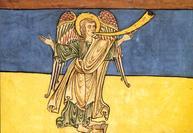 The release of the movie Left Behind has again drawn attention to the Christian belief in the rapture. The movie tries to portray the chaos in the world as millions of Christians suddenly disappear. This image has interested Christians for quite a while. I recall watching the Thief in the Night series of movies back in the 1970s (the Antichrist had sideburns!). But I am interested in a question that is often overlooked: what is the point of the rapture in the Bible?
The release of the movie Left Behind has again drawn attention to the Christian belief in the rapture. The movie tries to portray the chaos in the world as millions of Christians suddenly disappear. This image has interested Christians for quite a while. I recall watching the Thief in the Night series of movies back in the 1970s (the Antichrist had sideburns!). But I am interested in a question that is often overlooked: what is the point of the rapture in the Bible?
The idea of the rapture is based primarily on one passage in the Bible. In referring to the second coming of Christ, Paul says:
For the Lord himself will descend from heaven with a shout, with the voice of the archangel and with the trumpet of God, and the dead in Christ will rise first; then we who are alive who remain will be caught up with them in the clouds to meet the Lord in the air; and thus we will always be with the Lord. (1 Thess. 4:16-17)
The word "caught up" translates the Greek word ἁρπάζω (harpazō), which merely means to catch, snatch or take away. Our word rapture is based on the Latin translation of that word, raptus.
But I think that the purpose of the snatching is more important than the snatching itself. Paul says that we will be caught up "for a meeting (ἀπάντησις, apantēsis) with the Lord." What kind of meeting is this? (I hope it's not like some of the meetings that I am summoned to!) What did it mean to the first readers of Paul's letter? The word ἀπάντησις (along with its verb form ἀπαντάω and cognate synonyms ὑπάντησις and ὑπαντάω) is often used for a specific kind of meeting. In the ancient Mediterranean world, arriving rulers and other respected figures had to be met and welcomed outside the city.
A quote from Josephus illustrates this well-known custom:
But while these kings were spending time with him [Agrippa I], Marcus, the governor of Syria arrived. So the king [Agrippa], in order to keep proper respect toward the Romans, went out of the city to meet him [ὑπαντάω], about seven stadia [= one mile]. (Josephus, Ant. 19.340)
Agrippa (known in Acts 12 as the Herod who executed James and died of a worm infestation) showed respect by giving a formal welcome (ὑπαντάω) to the Roman governor a mile outside the city. Josephus uses the same set of words to describe the triumphal entry of Alexander the Great in Jerusalem (Ant. 11.327-329), as well as triumphal welcomes to other notables such as Vespasian, Titus and Jonathan (see Ant.13.101, Wars 7.100, 7.119, Life 1.411).
This custom of welcoming outside the city is also found in the Bible. When residents of Jerusalem come out to meet Jesus at his triumphal entry, it is called a ὑπάντησις (John 12:13). Sometimes it is practiced on a smaller scale. In Jesus' parable of the virgins, the bridesmaids are called outside to meet the bridegroom (Matt 25:1, ὑπάντησις; 25:6, ἀπάντησις). When Jesus goes to see Mary and Martha, Martha comes to meet him (ὑπαντάω) outside of town; quite likely, Jesus stops there and sends a messenger in so that she can meet him (John 11:20-30). The servants of the Galilean nobleman meet him (ὑπαντάω) outside when he returns to find his healed son (John 4:51). When Paul comes to Rome, Christians come out to meet him (ἀπάντησις) at Three Taverns, eleven miles from Rome (Acts 28:15). Other examples of this custom (and the same ἀπάντησις word-group) can be found in Gen 14:17, 18:2, 19:1, 33:8, Jdg 4:18, 11:31, 34 and Matt 8:34.
So this kind of meeting is a formal welcome, like a triumphal entry. Residents of the city go outside the city to welcome the visiting king and bring him back into the city. It is a time both of celebration and honor for the arriving dignitary. This meaning fits very well in the passage in 1 Thess 4. The Christians in Thessalonica were uncertain about what happened to their brothers and sisters who died (1 Thess 4:13-15). They did not know if those who had died would be able to participate in the return of Christ. Paul encourages them: not only will "the dead in Christ... rise first," but all the saints, living and dead, will participate together in a triumphal welcome of Jesus. Just as residents of a city go out to welcome a king and accompany him in, all the saints will rise to welcome Jesus to earth. The point of the snatching is not to escape, but to be part of a "meeting," the triumphal entry of Jesus.
Postscript: After writing this blog post, I did some additional research to see if the interpretation I gave is some new fad. It's not! Here is what John Chrysostom preached about 1 Thess 4:15-17 in the late 300s:
If He is about to descend, on what account shall we be caught up? For the sake of honor. For when a king drives into a city, those who are in honor go out to meet him; but the condemned await the judge within... We are carried upon the chariot of our Father. For He received Him up in the clouds, andwe shall be caught up in the clouds.Do you see how great is the honor? And as He descends, we go forth to meet Him, and, what is more blessed than all, so we shall be with Him. (Homily 8 on 1 Thess)
Of course, the interpretation I suggest isn't correct just because Chrysostom thinks so! But I am suspicious of interpretations of Scripture that are entirely new, and Chrysostom provides us with evidence that people understood 1 Thess 4:16-17 in this fashion a long time ago.
 Biola University
Biola University
.jpg)
.jpg)

